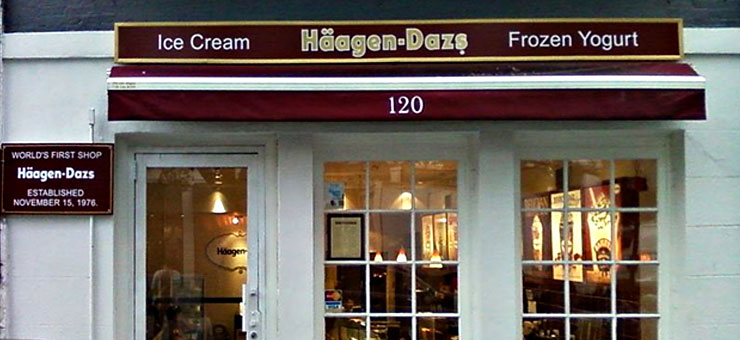
When Häagen-Dazs was launched in 1961 in New York, people thought it was an exotic Danish brand. People flocked to the store to taste the luxurious ice cream, which certainly tasted good. Now, the funny thing about the whole deal is that there were many competitors who sold ice cream just as tasty as Häagen-Dazs did. Only, people preferred Häagen-Dazs because they thought it was more exotic, more foreign and of a higher quality.
North European sounding companies usually have an image of being very high in quality. German, Danish, Swedish and Norwegian sounding names are associated with high quality and advanced technology. Moreover, being cold countries. Häagen-Dazs was an excellent way to entice people into buying premium ice cream priced at a higher level than competitors. People bought the idea and Häagen-Dazs continues to be one of the most popular ice cream brands in the world.
If you have a new brand or product to be launched and are wondering what to name it, using a nonsensical foreign sounding name can actually be a good idea. You can use a word that makes sense and is pretentious at the same time, if you know how to play along ironic humor. Foreign branding can be of great marketing value. Here are some of the languages that you can choose to make your names sound weird and foreign:
French – The chicest language of them all, French continues to be popular with luxury goods manufacturers and restaurants. Those who want to create an image of class, luxury and style usually go for French sounding names because of its obvious relationship with luxury and fashion. However, do not make the mistake of adding a ‘le’ or ‘la’ and not use a word with the appropriate gender inflection. That will not make you look pretentious even, but plain retard.
Italian – Italian sounding names are popular with wine makers, restaurants and fashion brands. Certainly, Milan has helped Italy to become one of the biggest fashion destinations. On top of this, Italy is also known for its vehicles and leather.
Spanish and Portuguese – These languages do not have a lot of ‘exotic’ value if you are a company based in the U.S. Due to a large number of Spanish speaking people from Latin America, Spanish and Portuguese sounding names tend to be considered ‘homely’ and not exotic enough.
Russian, Polish, Serbian – All the Eastern bloc-countries that speak Slavic languages have a typical sound. Moreover, they are also written in Cyrillic characters except Polish. If you are into manufacturing, science and technology, it might be a good idea to use a Slavic name for your product.
https://upload.wikimedia.org/wikipedia/commons/thumb/7/79/Tesla_circa_1890.jpeg/447px-Tesla_circa_1890.jpeg
After all, Nikola Tesla was a Serbian physicist.
German, Danish, Swedish and Norwegian – These countries in Northern Europe are associated with affluence, high quality and superior technology. Like Häagen-Dazs, premium products may be given a Nordic sounding name. Norse mythology also has a huge effect on people’s choices and names derived from Norse and Viking mythology may be used for a touch of mystery.
Japanese – Japan is known for its culture, automobiles and high technology. This futuristic country is world famous for its technology and superior science. Thus, if you are into manufacturing gadgets, it might be a good idea to name your product with a name that sounds Japanese. However, do not make it too difficult to pronounce as that may alienate your consumers.
Nonsensical Words – While any language can be used to derive brand and product names, sometimes it may be a good idea to invent names that mean nothing. Häagen-Dazs itself is a nonsensical name and means nothing. The creator just thought it sounded Danish and decided to use it. The brand is now really successful and a number of stores have sprung up all over the world.
Most people will insist that corporate identity guidelines will not allow them to steer away from what is the norm. However, industry experience shows that creativity, adventure and a touch of absurdity has always helped build grand brand images and corporate identities. With that in mind, one must not shy away from using foreign sounding names in fear of appearing fake. Consumers are well aware of foreign branding and they know how to appreciate a little humor.
https://upload.wikimedia.org/wikipedia/commons/thumb/1/1d/H%C3%A4agen-Dazs%27_first_shop.jpg/800px-H%C3%A4agen-Dazs%27_first_shop.jpg